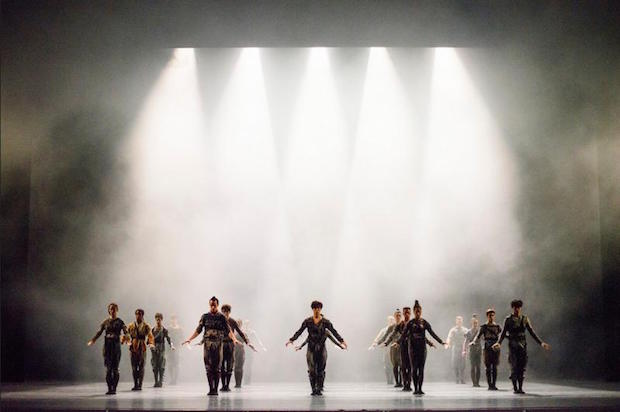A very British thing happened at the dance industry conference last weekend. Three of the UK’s most celebrated contemporary choreographers said British contemporary dance training is not up to snuff. Foreign dancers were better trained from a younger age, they said, were fitter, readier, worked harder. That’s why they got more jobs in British companies than UK-trained graduates.
The two instant results were (a) a chorus of outraged denial from the dance establishment and (b) the resignation of the chairman of Dance UK, the umbrella body and ‘voice of dance’, which staged the conference.
Now, its chairman, Farooq Chaudhry, was certainly playing some fairly brutal politics. He is the producer for Akram Khan, one of the dissident trio of celebrated dancemakers, alongside Lloyd Newson of DV8 and Hofesh Shechter (whose Royal Ballet debut creation I reviewed last month), and Chaudhry has been all over the papers and airwaves this week describing UK dance students as ‘mollycoddled’.
One would think professional standards a bread-and-butter issue for a dance conference, but Chaudhry had not forewarned the organisation he chaired, and greatest offence was taken not at the unthinkable idea of the UK falling behind Cuba and Belgium but at the discourtesy of the shock press release. The dance schools protested that they had no warning with which to answer back. Chaudhry agreed sorrowfully that his involvement ‘created public confusion about the position of Dance UK and my role as its chair’ and resigned mid-conference.
Yet the conference’s purpose was to identify the major themes of a ‘dance manifesto’ for the next government over the next five years and if quality of training isn’t a priority, I don’t know what is.
Instead, Dance UK sent its chairman packing. Still more alarming, many voices defended potential training inadequacies by leaning on some utopian definition of ‘diversity’ and ‘wholeness’ as the British advantage. Our students may not get jobs in the best British companies, goes this sophistry, but by gum they’re emerging as whole people, ready to profit from their dance training in all walks of life.
Hm. Let’s think of the end-user here. Most kids go into professional dance training wanting to be at the best possible place to train to the best possible advantage to join the profession. They’re not dreaming of becoming nicely socialised human beings. And let’s think of the taxpayers and parents, who fund and support these professional aspirations.
Furthermore, the charge made by Newson, Khan and Shechter against the top three contemporary schools, Trinity Laban, the London Contemporary Dance School and the Northern School of Contemporary Dance, was stark. The graduates emerging from their hands lacked ‘rigour, technique, discipline, performance skills’. Khan went so far as to describe current UK training as being an ‘obstacle’ to what he needed.
The choreographers cited Higher Education Statistics Agency figures on leavers’ destinations stating that only between 31 and 35 per cent of UK contemporary dance graduates find paid employment as dancers or choreographers, figures which the schools are hotly disputing.
Now, the three choreographers do all have a few British-trained dancers in their companies right now, and indeed Khan himself is a former Northern School graduate of the 1990s. It’s also germane that the three are so vastly different from each other in their stylistic demands of their dancers that I would think it unlikely that a three-year professional contemporary dance training (it’s much shorter than ballet) could produce one dancer, let alone many, capable of mastering Khan’s speedy intricacy and Shechter’s weighty power and Newson’s provoking psycho-dramas.
However, surely the aim of training is not to know everything but to learn the tools and the intelligent attitude to address challenges and develop oneself. It is not about being lovely rounded human beings. Sylvie Guillem, after all, is Mademoiselle Non, not Mademoiselle Oui.
And this was underscored by what Tamara Rojo, the charismatic ballerina-director of English National Ballet, said last week in advance of the BBC’s Young Dancer competition (being broadcast over the next couple of weeks). She said today’s Britain was not cultivating the work ethic in youngsters – they were too quickly congratulated by teachers concerned to be kind.
These are giant people in British dance uniting in the same message. Yet in the conference’s heated final session Newson told his critics that he had tried to have ‘conversations’ with the offending dance schools without result. So maybe that grenade of a press release was intended to shock a dance establishment increasingly in hock to a kindly social agenda where all must have prizes.
I’m alarmed by Dance UK’s wet behaviour. Its devotion to Sir Peter Bazalgette’s socialist agenda for cultural diversity and inclusion is not altogether a bad thing – indeed dance in Britain is extraordinarily varied, with a huge range of cultures feeding it, and the focus on dancing as a beneficial public activity is effectively making many political friends.
However, what’s going on here is an art argument. Khan, Newson and Shechter are triumphant British art assets, and they want our young dancers to have a realistic chance of joining in their success-stories. The dance schools have utterly rejected the choreographers’ accusations, meaning that no one is any the wiser about the rights and wrongs.
Dance UK, rather than shoving its chairman and dismissing the choreographers’ protests, should have accepted the challenge put. A simple statement insisting that performance standards are just as important as social benefits, and that it would facilitate the needed ‘conversation’, would have done it.
But it did not. It pointedly turned its back on some of our finest creative artists and the absolutely core issue of whether our young dancers in training are being let down. Dance UK describes itself as the voice of dance, but on this issue the voice doesn’t apparently wish to speak. It must.






Comments